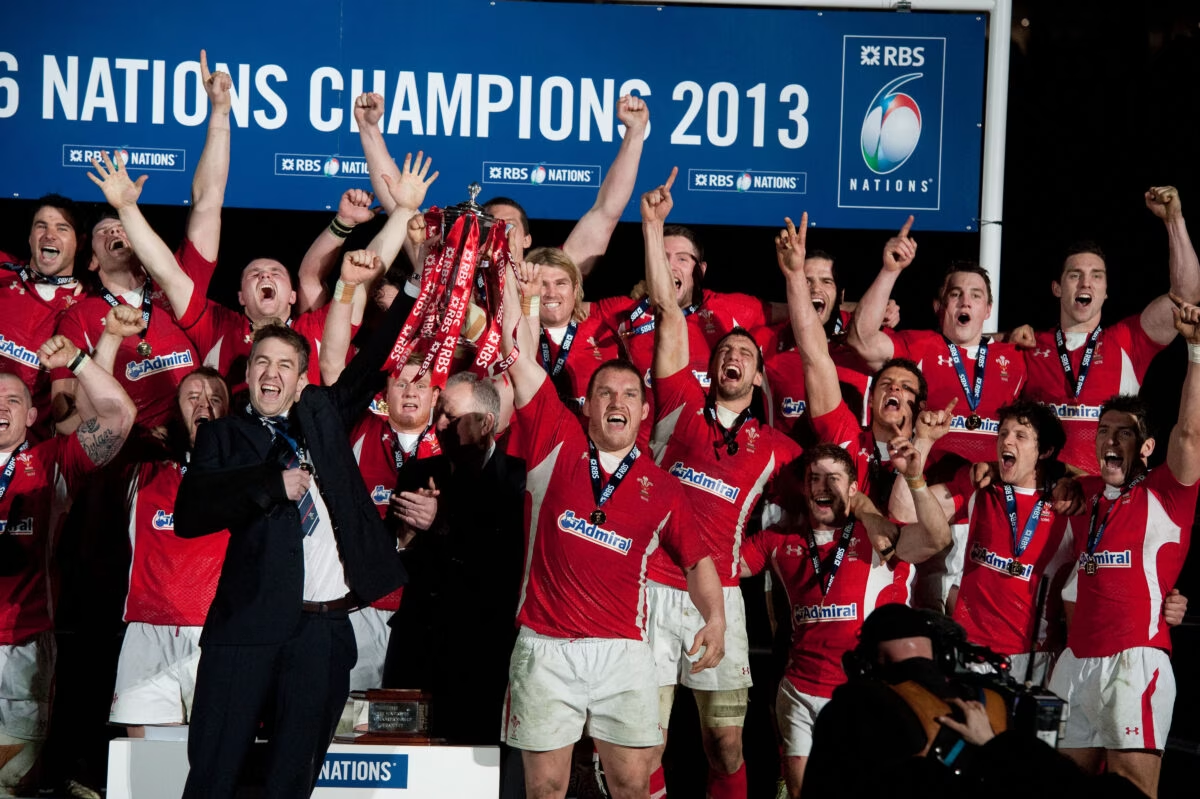The greatest rugby hits of yesteryear continue to roll on our screens during lockdown and this week’s offering from S4C is another classic Wales v England contest.
Everyone knows where they were when Wales beat the auld enemy at Wembley in 1999 and on Friday night (29 May) you’ll be able to recall what you were doing on Saturday, 16 March, 2013.
England were on course for a Grand Slam, but so well had Wales, under Rob Howley, recovered after losing to Ireland in their opening match in Cardiff that they were still in the hunt for back-to-back titles. England needed to win, Wales had to triumph by seven or more points to retain their title.
The tension was almost unbearable, the atmosphere electric and few people could have predicted the fireworks of the second half after the teams changed ends with Wales ahead 9-3. An Owen Farrell penalty was the only English first half score in the 20th minute – and magnificent Welsh defence meant they didn’t score again in the next hour of the match.
No wonder, then, that Howley proclaimed “this is better than the Grand Slam last year – we were outstanding”.
As for England, head coach Stuart Lancaster hit the nail on the head when he admitted “Welsh physicality was better than ours”. After Alex Cuthbert had run in his two second half tries the 74,104 started chanting “easy, easy” as they heralded a record winning margin of 27 points over England.
Jamie Roberts, Mike Phillips and Andrew Coombs will add their memories and insight from that great occasion in Friday night’s show – Dyddiau Da: Rygbi – Cymru v Lloegr 2013, S4C 9.00pm – but here are the thoughts of Dragons hooker Richard Hibbard on the intensity of the battle for supremacy up front.

England lost four scrums of their five scrums, conceded 12 penalties to Wales’ 7 and were forced to make 151 tackles – 52 more than the home side. Wales enjoyed 63% possession and 65% territory as they ended a run of four successive home defeats and put the Grand Slam chasers to the sword.
“The match itself was brutal – so fast, intense and exhausting,” recalled Hibbard. “I remember looking up at the clock, thinking we were midway through the first-half, but only 12 minutes had gone. I wondered how I was going to last.
“I can also recall rushing out of the defensive line to put a big hit on Joe Marler. I heard the crowd react as I connected. It was one of those games where you feel battered, physically, but adrenalin keeps you going.
“We gave England a hard time in the scrums that night and they weren’t very happy. They were complaining to Steve Walsh, the referee, but he wasn’t that interested and thought they were just moaning.
“They were going down at every hit and I think that was because of the power that was coming through in our scrum. It`s a great feeling when that happens. You know you have the edge, you know the ref knows it, and you know that you`re likely to win a penalty because they can`t handle the pressure.

Welsh props Gethin Jenkins and Adam Jones
“England`s complaints just told me they were getting flustered. At one point the scrum collapsed, Dan Cole landed on top of me, and he tried to choke me. We laughed about it later on the Lions tour.”
Having recovered from their Irish defeat, Wales had beaten France, Italy and Scotland on the road. An injury to Ryan Jones against the Scots meant Justin Tipuric and Sam Warburton started together for Wales for the first time in a re-shaped back row.

Alex Cuthbert
Tipuric was inspired and rightfully gained the man-of-the-match award for his prodigious work in defence on top of his alertness and skills in attack.
Every Welsh fan’s mental highlights reel consists of Tipuric’s sublimely skilful involvement in the two counter-attacking tries claimed by the rampaging Alex Cuthbert.
But it would be a mistake to re-imagine this game as some sort of free-flowing classic. For the most part it was compelling viewing because of the tension and trench warfare around the scrums, rather than much else that matched up to those two tries.
The 2.5 tries per game that season was the lowest in the championship’s history, while in that final game on what turned out to be a “Super Saturday” for Welsh fans, there were an incredible 11 collapsed scrums, of which six were re-set and 10 resulted in penalties or free-kicks.
The ball came back into play from a scrum just three times – not that many of the Welsh fans minded that night, and certainly none of the members of the Front Row Union wearing red shirts.
“To beat England by that much, and win the championship, felt unbelievable. It was the biggest winning margin ever by a Welsh side against the English – so that’s going to feel good,” added Hibbard.
“But the moment that really sticks in my mind was when they turned all the lights out in the stadium just before we lifted the trophy. I could feel the presence of 75,000 people as if they were sitting on my chest. It made me tremble.
“Then, the lights came on, the fireworks exploded, and everyone just went nuts.”

